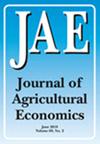2019冠状病毒病与印度农场管理:来自班加罗尔城乡结合部的证据
IF 4.2
2区 经济学
Q1 AGRICULTURAL ECONOMICS & POLICY
引用次数: 0
摘要
我们研究了2020年6月至2021年3月印度第一波COVID - 19感染期间小农的农场管理决策。我们使用了来自班加罗尔农村-城市界面256个农户的面板数据,这些数据来自COVID - 19前的面对面调查和第一波COVID - 19浪潮结束时的电话调查。我们将该调查数据与分区和村级的COVID - 19感染人数数据以及降雨量数据结合起来。固定效应面板数据模型的结果表明,以分区和村级COVID - 19感染数量衡量的COVID - 19暴露程度越高,对采用可持续农业做法的数量产生积极影响。相反,更高的COVID - 19暴露率与使用化肥和农药等外部投入物处理的作物比例减少有关。结果表明,与COVID - 19暴露水平相关的破坏限制了农民获得农业投入物的机会,促使他们转向可持续的农业实践。本文章由计算机程序翻译,如有差异,请以英文原文为准。
COVID‐19 and Farm Management in India: Evidence From the Rural–Urban Interface of Bangalore
We examine farm management decisions of smallholder farmers during the first wave of COVID‐19 infections in India between June 2020 and March 2021. We use panel data from 256 farm households in the rural–urban interface of Bangalore from a pre‐COVID‐19 face‐to‐face survey and a phone survey at the end of the first COVID‐19 wave. We combine this survey data with sub‐district and village level data on the number of COVID‐19 infections as well as rainfall data. Results of fixed effects panel data models show that higher COVID‐19 exposure, measured by numbers of sub‐district and village level COVID‐19 infections, positively affects the number of sustainable agricultural practices adopted. Conversely, higher COVID‐19 exposure is related to a reduction in the share of crops treated with external inputs such as fertilisers and pesticides. The results suggest that disruptions related to COVID‐19 exposure levels restricted farmers' access to agricultural inputs, prompting a shift towards sustainable agricultural practices.
求助全文
通过发布文献求助,成功后即可免费获取论文全文。
去求助
来源期刊

Journal of Agricultural Economics
管理科学-农业经济与政策
CiteScore
7.90
自引率
2.90%
发文量
48
审稿时长
>24 weeks
期刊介绍:
Published on behalf of the Agricultural Economics Society, the Journal of Agricultural Economics is a leading international professional journal, providing a forum for research into agricultural economics and related disciplines such as statistics, marketing, business management, politics, history and sociology, and their application to issues in the agricultural, food, and related industries; rural communities, and the environment.
Each issue of the JAE contains articles, notes and book reviews as well as information relating to the Agricultural Economics Society. Published 3 times a year, it is received by members and institutional subscribers in 69 countries. With contributions from leading international scholars, the JAE is a leading citation for agricultural economics and policy. Published articles either deal with new developments in research and methods of analysis, or apply existing methods and techniques to new problems and situations which are of general interest to the Journal’s international readership.
 求助内容:
求助内容: 应助结果提醒方式:
应助结果提醒方式:


